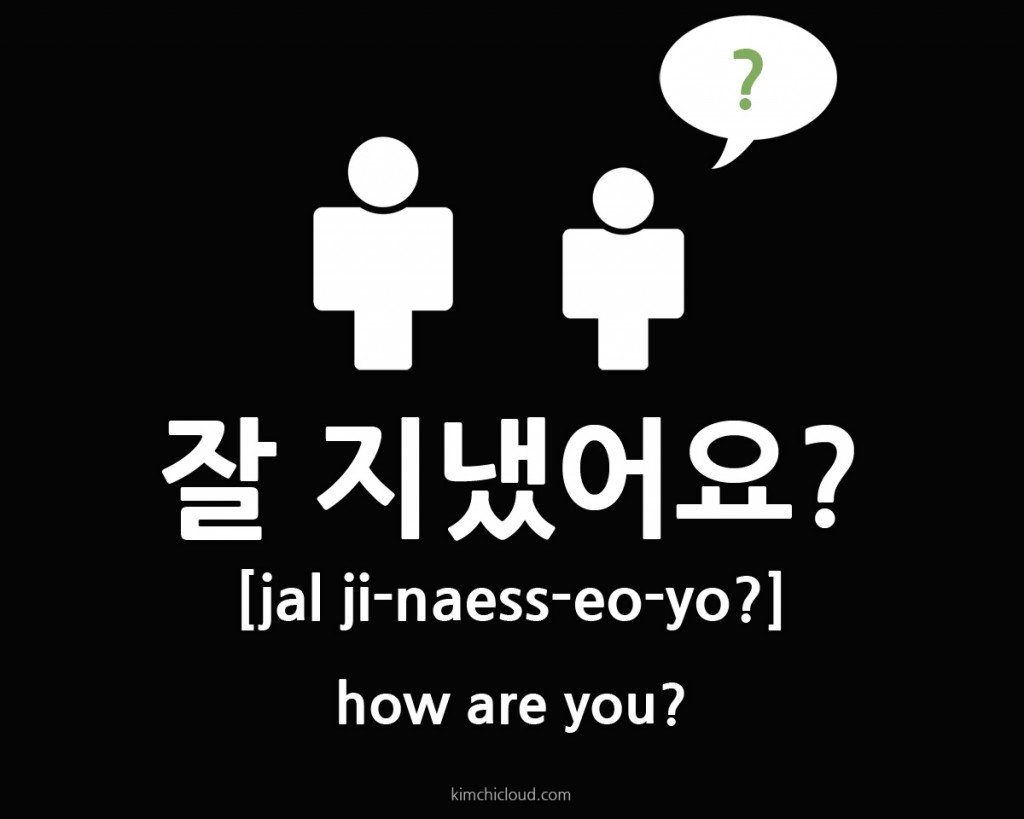잘 지냈어요? – How are you? in Korean
How Are You in Korean
In this lesson you will learn how to say ‘how are you?’ in Korean. The way you say this differs somehow from how you would say it in English, as is does not translate literally from Korean to English. Furthermore, there are a few different ways to say it in Korean, depending on a few different factors. But fear not! Because in just a few minutes, everything will make perfect sense. So the most standard way to say ‘how are you?’ in Korean is:
jal jinaess-eo-yo?
In Hangul: 잘 지냈어요?
= How are you? (polite)
Jal (잘) means ‘well’, jinaesseoyo (지냈어요) means something in the words of ‘spent time’, but translated to understandable English, it is read ‘Have you been well?’ The ‘yo’ (요) at the end tells us that’s the polite form, making it suitable to use with:
- Talking to someone older than you
- Someone who is similar age as you but not close friends
- Teachers or professors
- Bosses and people with higher status than you (age, rank etc)
Unless you feel comfortable with your Korean and don’t want to offend anyone, this is what you should use. With that said, most Koreans won’t expect foreigners to understand this kind of concept but you will most likely fail to make a good impression if you speak to them in ‘lower’ form, like you would to your friends. So what would you use when speaking to friends?
jal jinaess-eo?
In Hangul: 잘 지냈어?
= How are you? (close, informal)
As you can see, the only difference between these two sentences is that ‘yo’ (요) is lacking in the second one. So removing ‘yo’ (요) makes it more intimate and informal and more suitable for use with:
- Close friends and people who are younger than you.
- Siblings
- Parents (but not traditionally)
jal isseoseoyo?
In Hangul: 잘 있었어요?
= How are you? (polite)
This expression has the same meaning as the expressions mentioned above. The ‘yo’ (요) at the end, again, makes it polite. So to make it more casual and friendly, you drop it. This literally means ‘how have you been?’.
bap meogeosseoyo?
In Hangul: 밥 먹었어요?
= Did you eat yet? (polite)
This one can be tricky at first if you are not familiar with Korean culture. bap (밥) means rice or food and meogeosseoyou (먹었어요) means ‘ate’ (eat, past tense). So while this does indeed translate to ‘did you eat yet?’ it is more like a greeting than anything else. To be more specific, it is an inquiry about your well-being, so in a sense, they are asking how you are. Some Koreans might want to give you food if you answer ‘no’ so be aware of that. Again, notice the ‘yo’ (요) at the end. You can always remove it when speaking with friends.
So how would I respond when someone asks me how I’m doing?
There are a few ways in which you can respond, depending on the question. To put it simply, you just take what they said, add ‘네’ in front of it and don’t raise the tone at the end. So, in other words:
Ex 1:
A:
잘 지냈어요?
[jal jinaesseoyo?]
= How are you?
B (response):
네, 잘 지냈어요.
[ne, jal jinaesseoyo.]
= I’m good. (yes I’ve been well)
Ex 2:
A:
잘 지냈어?
[jal jinaesseo?]
= How are you?
B (response):
응, 잘 지냈어.
[eung, jal jinaesseo.]
= I’m good. (yes I’ve been well)
(eung (응) is the casual way of saying ‘yes’ in Korean.)
Ex 3:
A:
밥 먹었어요?
[bap meogeosseoyo?]
= Did you eat yet?
B (response):
네, 먹었어요.
[ne, meogeosseoyo.]
= Yes, I ate
This is pretty much all you need, and more, in order to ask someone how they are in Korean. For more lessons like this one, check out our everyday Korean archive If you have any questions or comments, make sure to let us now in the comments below and we will do our best to help you out! Also, we would really appreciate it if you would like us on facebook or twitter.
By: Kimchi Cloud





